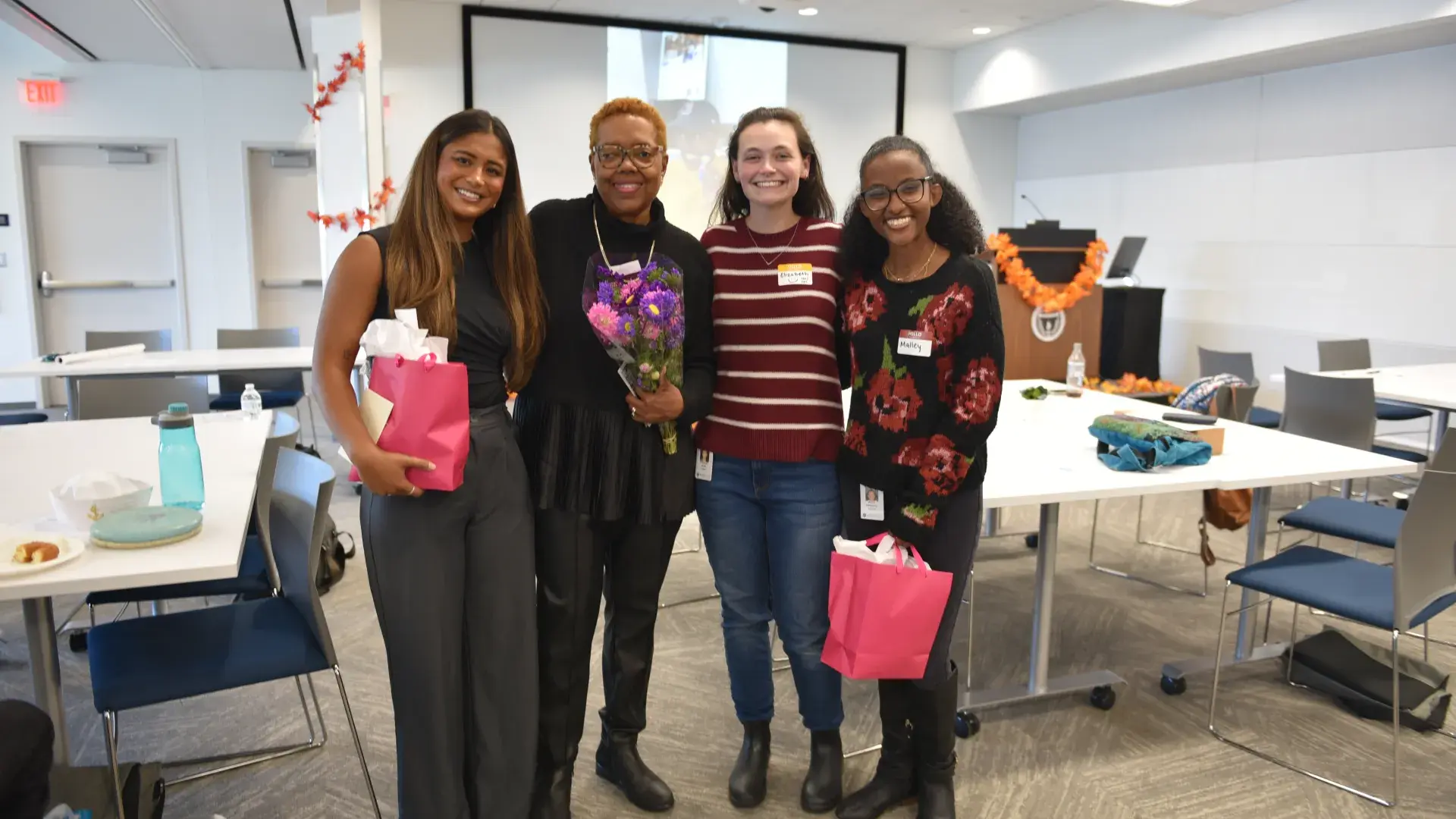
Graduates of the Spaulding-IHP’s Comprehensive Aphasia (S-IHP's CAP) program celebrate their accomplishments
Donna Latson Gittens stood at the podium and regaled the audience in 1 CW with the story behind the World Series ring that she received from her work with the Boston Red Sox, which she then passed around the room.
With a background as a vice-president working in television broadcasting, the founder and CEO of More Advertising, and a motivational speaker, this was certainly not the first time she had spoken to a crowd. But this was different. She was sharing the story of the comeback by the 2004 Boston Red Sox with an audience there to see her and fellow participants graduate from the Spaulding-IHP’s Comprehensive Aphasia (S-IHP's CAP) program.
S-IHP's CAP is a six-week intensive treatment program for adults with aphasia, a language disorder that often occurs after stroke, which can impact aspects of language, including written and spoken communication. The program, a collaboration with nearby Spaulding Rehabilitation Hospital, is designed to maximize patients’ recovery so they can return to activities.
There are one-on-one and group speech-language therapy, occupational therapy, and physical therapy sessions. The participants also take part in adaptive sports, such as cycling, bocci, golf, pickleball, and kayaking; a wellness group, where they tried different meditation and mindfulness activities to see what worked best for each individual. Music therapy was also highlighted during graduation with the performance of several songs, including the original lyrics in a song called, “Aphasia Blues” set to the song, “Bad to the Bone.”
The program is led by speech language pathology and occupational therapy students with faculty supervision.
“This program so beautifully exemplifies the mutual benefits that our clients and our student clinicians experience,” remarked Rachel Pittmann, Assistant Dean of Interprofessional Practice and a former clinical preceptor in the S-IHP’s CAP program. “In addition to the progress our clients make, it is this intensive rehabilitation program that gives our students the opportunity to immerse themselves in this six-week interprofessional practice, practicing with and alongside one another in the evaluation and treatment of shared clients.”
During the graduation, Karina Absalon, a second-year Entry-Level Doctor of Occupational Therapy student, explained about some of the group sessions such as Tech Tuesdays where they looked at accessibility features on apps to help communicate with others via text, phone, Facetime, or email; Wellness Wednesdays, including mindfulness, gratitude sleep, hygiene, and yoga; and Food Fridays, where the clients and students worked to prepare a meal together using adaptive cooking equipment and math skills to triple the recipes. Absalon thanked the seven participants on behalf of her fellow students for “allowing us to practice real clinical skills and to learn beside them.
"There are good and bad days, but showing up and trying as these seven clients did, exemplifies their motivation and persistence,” continued Absalon. “Thank you again for this chance to get to know you and work with you all. Just as we hoped to make a difference in your lives, you have all made a strong difference in ours.”
Each participant gave a presentation during graduation on a topic of their choosing along with the student or students who worked with them. Latson Gittens shared what it was like to be part of the Red Sox family as a community relations advisor, witnessing, the greatest comeback in Major League Baseball history against the New York Yankees, also known as the “Evil Empire” during the American League Championship Series. She then traveled with the team to attend the final game of the World Series against the St. Louis Cardinals, on a trip paid for by the late Red Sox CEO and President Larry Lucchino.
Other participants shared their own stories — personal journeys, details on their families and lives, and even a summary of the museums one of them visited during the program. The presentations were a culmination of all their hard work during the six weeks and the students recognized each participant with an award. Malley Andemeskel and Elizabeth Sicard, both second-year Master’s in Speech-Language Pathology students, worked with Latson Gittens, giving her the “Captain of the S-IHP” award and referring to her as the “mayor of Spaulding.”
“To see the progression over the past few weeks with our own eyes has been really cool,” said Andemeskel, who worked with Latson Gittens for the duration of the program. “She has been incredible.”
“It was daunting at the beginning of the program, learning from the students and the community that I came to love,” said Latson Gittens. “I was truly amazed at the benefits of the program. I especially enjoyed riding a recumbent bike. It was a joy to ride a bike again.”
Sicard, who initially interacted with all the participants before focusing on working with Andemeskel and Latson Gittens, said, “I think the biggest thing we found was increased confidence and finding community,” said Sicard. “A lot of the caregivers reported that knowing people in similar shoes was really beneficial and rewarding.”
As Latson Gittens knows, community and team can lead to incredible success. And she has the World Series championship rings from not just 2004, but 2008, 2013, and 2018 to prove it.
Do you have a story the Office of Strategic Communications should know about? If so, let us know.
